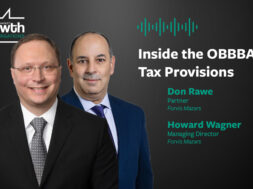Middle-Market Public Policy Roundup
The Fed opens the Main Street Lending Program, PPP gets an update, lawmakers raise concern over 401(k) plans adding private equity to their offerings, and more.

This post was last updated at 10 a.m. on June 18.
In this week’s roundup, we look at the Federal Reserve’s long-anticipated Main Street Lending Program, which launched this week. In addition, we provide a summary of a rule change to the Paycheck Protection Program, concern from lawmakers about 401(k) plans adding private equity to their offerings, and the speaker lineup for the Securities and Exchange Commission’s upcoming Small Business Forum.
Fed Launches Main Street Lending Program
After months of revisions, the Federal Reserve’s long-awaited lending program is now open.
The Federal Reserve Bank of Boston, which facilitates the Main Street Lending Program, announced Monday that the program is open to registration for lenders and is ready to begin making loans immediately.
“I encourage all eligible lenders to register in order to provide loans to eligible borrowers as soon as possible,” Treasury Secretary Steven Mnuchin said in a statement shortly after the program launched.
The lending program was designed to help small and medium-sized businesses access credit that could help them through the hardship created by the COVID-19 outbreak.
To assist businesses, the program offers five-year loans with floating rates, with principal payments deferred for two years and interest payments deferred for one year. To support a broad set of businesses, the loans range in size from $250,000 to $300 million.
The program was established with the approval of the Treasury, which committed $75 billion in funding from the CARES Act.
To participate in the program, lenders must register using the lender portal. Borrowers must apply for the program loans through a participating lender. Information for borrowers is available on the program website.
SBA Announces New Paycheck Protection Program Guidance
The Small Business Administration made changes to the Paycheck Protection Program Flexibility Act, or PFA, last week.
The agency issued an interim final rule on June 10 that alters the PFA signed by President Trump earlier this month.
According to analysis by accounting firm CLA, the SBA’s clarifications include reducing the amount of the PPP loan eligible for forgiveness if less than 60% of the funds were used to cover payroll costs.
In addition, the rule change says no payments of principal or interest will be due until the SBA processes the loan forgiveness amount to the lender, as long as the borrower submits a loan forgiveness application within 10 months after the end of the covered period, which lasts until the end of the year.
The last day a lender can obtain an SBA loan number for a PPP loan is June 30, 2020.
Funding still remains under PPP. According to the SBA, the program has more than $129 billion available.
Lawmakers Raise Concern Over 401(k) PE Access
A group of lawmakers led by Sen. Sherrod Brown, D-Ohio, are demanding answers from the Department of Labor after a decision made earlier this month that could open retirement plans to private equity investment.
Brown, who currently serves as the ranking member of the Senate Banking Committee, and six other senators, including former Democratic presidential hopefuls Bernie Sanders, D-Vt., and Elizabeth Warren, D-Mass., submitted a letter last Friday to Labor Department Secretary Eugene Scalia in response to DOL’s June 3 Information Letter, which could encourage employer retirement plans to invest with private equity funds.
The senators are pushing for answers regarding the information the DOL considered before encouraging Americans to pursue private equity investments, according to a statement, but did not disclose a deadline for the Labor Department to respond.
Advocates stress that private equity investments can achieve higher returns for 401(k)s, and they question why pension plans have access to private equity while individual retirement plans don’t.
“This Information Letter will help Americans saving for retirement gain access to alternative investments that often provide strong returns,” Secretary of Labor Eugene Scalia said in a statement.
Pension plans nationwide have been one of the largest sources of private equity funding in recent years. A 2019 report from the American Investment Council showed pensions described a study from researchers that found private equity continues to generate returns that are 2% to 3% above the returns of public markets.
Investment vehicles dedicated to private markets have been seen by pension systems as a way to maintain growth targets to cover financial liabilities, particularly as the number of publicly listed companies in the U.S. has declined since the mid-1990s.
SEC Announces Speakers for Small Business Forum
The Securities and Exchange Commission announced the speaker lineup for its virtual Small Business Forum.
The forum, which will take place on June 18, will feature a keynote address from Small Business Administration chief Jovita Carranza, and representatives from the venture capital and small business community.
Following the spotlights and keynotes, participants will engage in collaborative policy sessions to craft suggestions to improve securities policy impacting how companies raise capital from investors, the SEC said.
“Access to capital is more critical now than ever for small businesses across the country, from startups to small cap public companies,” said Martha Miller, the SEC’s Advocate for Small Business Capital Formation in a statement. “The Forum is an opportunity to highlight success stories from businesses and their investors, as well as to address challenges faced in the current environment.”
The first collaborative session will discuss policy recommendations to improve the framework by which companies raise capital from investors in the exempt, or private, markets. The second session will focus on policy recommendations to address challenges faced by companies seeking to go public or that are smaller public companies.

Benjamin Glick is Middle Market Growth’s associate editor.


